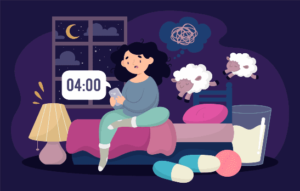In a fast-paced world filled with constant distractions and stressors, sleep is often elusive for many people. Insomnia, a common sleep disorder, can have a significant impact on one’s quality of life. Fortunately, there are various effective insomnia therapy options available to help individuals regain control over their sleep patterns and improve their overall well-being. In this comprehensive guide, we will explore the causes, symptoms, and a variety of evidence-based treatments for insomnia.
Contents
How To Treat Insomnia?

Treating insomnia effectively involves a combination of lifestyle changes, cognitive-behavioral therapy (CBT), and sometimes medication. Here’s a step-by-step guide on how to treat insomnia:
- Identify Underlying Causes: Start by identifying any specific triggers or underlying causes of your insomnia. This could include stress, medical conditions, medications, or lifestyle factors.
- Improve Sleep Hygiene:
- Establish a consistent sleep schedule by going to bed and waking up at the same times every day, even on weekends.
- Create a comfortable sleep environment by keeping your bedroom dark, quiet, and cool. Invest in a comfortable mattress and pillows.
- Limit exposure to screens (phones, computers, TVs) at least an hour before bedtime, as the blue light emitted can interfere with your sleep-wake cycle.
- Avoid heavy meals, caffeine, and alcohol close to bedtime, as they can disrupt sleep.
- Practice Relaxation Techniques: Incorporate relaxation techniques into your bedtime routine, such as deep breathing, progressive muscle relaxation, or meditation. These can help calm your mind and body before sleep.
- Exercise Regularly: Engage in regular physical activity, but avoid vigorous exercise close to bedtime, as it can be stimulating. Aim for at least 30 minutes of moderate exercise most days of the week.\
What is Insomnia Therapy?
Insomnia therapy refers to the various approaches and treatments used to address and manage insomnia, a common sleep disorder characterized by difficulty falling asleep, staying asleep, or experiencing non-restorative sleep despite having the opportunity and desire to sleep.
Insomnia therapy aims to improve the quality and duration of sleep, alleviate the associated distress and impairment, and enhance an individual’s overall well-being.
Traditional Approaches to Insomnia Therapy
Here are some traditional approaches to insomnia therapy:
- Lifestyle Modifications:
- Sleep Hygiene: This involves adopting healthy sleep habits, such as maintaining a consistent sleep schedule, creating a comfortable sleep environment (cool, dark, and quiet), and avoiding stimulating activities close to bedtime.
- Diet and Exercise: Regular physical activity and a balanced diet can promote better sleep. However, you should avoid vigorous exercise close to bedtime.
- Cognitive-Behavioral Therapy for Insomnia (CBT-I):
- CBT-I is a well-established and highly effective psychotherapy for insomnia. It focuses on identifying and changing thought patterns and behaviors that contribute to sleep problems.
- Key components of CBT-I include sleep restriction, stimulus control, relaxation techniques, and cognitive restructuring. These techniques help individuals establish healthier sleep patterns and reduce sleep-related anxiety.
- Sleep Restriction: This involves limiting the time spent in bed to match the actual amount of sleep obtained, which can help consolidate sleep and improve sleep efficiency.
- Stimulus Control: This technique aims to reassociate the bed with sleep by encouraging individuals to use the bed only for sleep and sex, and to avoid activities like watching TV or working in bed.
- Relaxation Techniques: Practices such as progressive muscle relaxation, deep breathing exercises, and mindfulness meditation can help reduce physical and mental tension, making it easier to fall asleep.
- Cognitive Restructuring: CBT-I helps individuals identify and challenge negative thoughts and worries about sleep that contribute to insomnia.
- Sleep Education: Understanding the science of sleep and the factors that impact it can empower individuals to make informed choices about their sleep routines.
- Sleep Monitoring: Keeping a sleep diary or using sleep-tracking devices can help individuals and healthcare providers track sleep patterns and identify areas for improvement.
- Gradual Exposure to Light: Exposure to natural light during the day and avoiding bright screens and artificial light in the evening can help regulate the body’s internal clock and improve sleep-wake patterns.
- Progressive Relaxation: This involves systematically relaxing different muscle groups in the body, reducing physical tension and promoting relaxation conducive to sleep.
- Biofeedback: Biofeedback techniques help individuals gain control over physiological processes like heart rate and muscle tension with insomnia.
- Counseling and Psychotherapy: Addressing underlying psychological issues, such as anxiety or depression, through counseling or psychotherapy can be an essential part of treating insomnia when these conditions are present.
- Sleep Support Groups: Group therapy or support groups can provide a supportive environment for individuals with insomnia to share experiences, learn from others, and receive guidance from mental health professionals.
The Emergence of Insomnia Group Therapy

Insomnia group therapy is an emerging and increasingly popular approach to treating insomnia. Furthermore, it offers a unique and supportive environment where individuals with similar sleep challenges come together under the guidance of a trained therapist or facilitator to address their insomnia collectively. This form of therapy leverages the benefits of group dynamics, shared experiences, and structured interventions to improve sleep quality and overall well-being.
Key Components of Insomnia Group Therapy:
- Group Dynamics: Insomnia group therapy typically consists of a small group of individuals who meet regularly to discuss their sleep problems. The group dynamic can provide a sense of camaraderie and reduce feelings of isolation that often accompany insomnia.
- Sleep Hygiene: Participants learn about sleep hygiene practices that can improve sleep quality, including maintaining a consistent sleep schedule, creating a comfortable sleep environment, and avoiding sleep disruptors like caffeine and screens before bedtime.
- Sharing Experiences: Group members have the opportunity to share their personal experiences with insomnia, including their challenges and successes. This sharing can provide emotional support and validation, as well as practical tips and coping strategies.
- Accountability: Group therapy participants help to keep sleep diaries and track their progress. Accountability to the group can motivate individuals to adhere to their treatment plans and make necessary changes in their sleep habits.
How Insomnia Group Therapy Works
Insomnia group therapy is a structured therapeutic approach that brings together individuals who are experiencing insomnia or sleep difficulties. Furthermore, under the guidance of a trained therapist or facilitator, participants in a group setting work collaboratively to address their sleep issues and improve their sleep quality. Here’s how insomnia group therapy typically works:
- Assessment and Screening: Before joining an insomnia group therapy program, participants often undergo an initial assessment or screening to determine the nature and severity of their sleep problems. This assessment helps identify individuals who would benefit most from group therapy and ensures that participants have a shared focus on improving their sleep.
- Group Formation: A group of individuals with similar sleep challenges is formed, typically consisting of 6 to 10 participants. The composition of the group can vary, but it’s essential that participants can relate to and support one another’s experiences.
- Structured Sessions: Insomnia group therapy is typically conducted in a series of structured sessions, which may be held weekly or biweekly. The number of sessions and their duration can vary depending on the program and the needs of the participants.
Choosing Therapist Insomnia Therapy

Selecting the right therapist for insomnia therapy is a crucial step in your journey to improve your sleep and overall well-being. Furthermore, the therapist you choose should have the appropriate qualifications, expertise, and interpersonal skills to effectively address your sleep issues. Here are some essential factors to consider when choosing a therapist for insomnia therapy:
- Credentials and Qualifications: Ensure that the therapist you choose is licensed and qualified to provide therapy for sleep disorders. Look for professionals who have specific training or certifications in sleep medicine or cognitive-behavioral therapy for insomnia (CBT-I).
- Experience with Insomnia: Seek a therapist with experience in treating insomnia or other sleep disorders. An experienced therapist is more likely to have a deep understanding of the complexities of sleep problems and can tailor treatment to your unique needs.
- Specialization: Look for therapists who specialize in sleep disorders or CBT-I. Furthermore, these specialists are likely to be well-versed in the latest research and evidence-based approaches for treating insomnia.
- Referrals and Recommendations: Ask for referrals or recommendations from your primary care physician, a sleep specialist, or trusted friends and family members who have undergone insomnia therapy. Personal referrals can provide valuable insights into the therapist’s effectiveness and approach.
Conclusion
Insomnia is a challenging condition that can have far-reaching effects on physical and mental health. While traditional approaches like medications and CBT-I are effective, insomnia group therapy offers a unique and promising alternative. By sharing experiences and learning from others, individuals with insomnia can find the support and strategies they need to improve their sleep quality and overall well-being. If you are looking for an affordable Online Therapy TherapyMantra can help: Book a trial Online therapy session.


